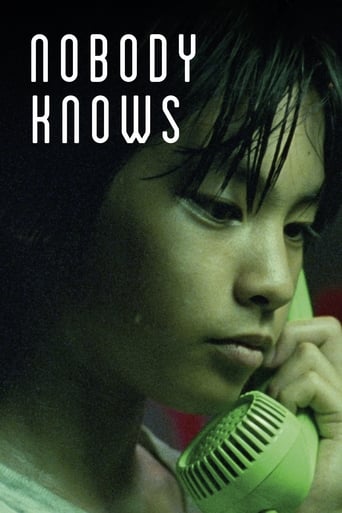yushelly
I watched it a few years ago when I was maybe 15 years old, and now I am re-watching it for a university essay. I remember this film touched me deeply. I remember thinking on how I could have saved the children if I became their friends. I was imagining myself helping them, and living with them when their mom quit. I took the money, and I educated them, allowing them to go to school, to seek help from the city counsels...But the whole point of this movie, although frustrating, is all about letting you take a look a this incident that happened for real (and worse) the movie actually gave it a softened tone, less atrocious.
Now that I have re-watched it, I think this work represents very well Kore-eda's early works style influenced by his documentary practices; the way he directs his films: giving the most freedom to the actors themselves, allowing them to play naturally, so that the final result captured on camera unfolds so naturally and convincingly.
It's all on the details the director captures: the hands, the objects, the lowered camera angle to see what the children sees, the dirty nails, etc. The camera points out the importance Kore-eda wants us to focus on, and these items are evoking emotions. They reveal memories from the past with the mother: the nail polish. The multiple shots on the little red piano reveals the the young girl's strong desire to learn piano. The laughter reveals the innocence of the children not aware of the situation, etc. Every detail adding up makes the whole, like the details in our life that seems non significant adds up to be our whole life...and that is what matters.
Naren k
What a beautiful movie this is. The story of abandoned kids doesn't necessarily be associated with streets and rags. 'Nobody Knows' is one such movies , set in Tokyo, of kids that are result of a careless mothers who abandons them and the struggles they go though. This has taken me through an emotional roller-coaster with out any actual major drama but huge shift in characters maturity. The performance of kids is mind blowing. Story was told in very subtle tone with great intensity. Superb photography and great background soundtracks . There are very less verbal conversations in this movie which makes it easy for an non Japanese like me.
bandw
This story of four children abandoned in a Tokyo apartment by their mother tried my patience. The oldest child, Akira, was more mature at age twelve than his goofy mother.I found many scenes that could have lasted but a few seconds went on for what seemed like minutes. For example, there are several scenes of Akira running that just go on and on. The movie could have easily been trimmed by an hour. If the goal of drawing things out was to have the audience suffer along with the kids, then the movie was successful on that count. The effect on me was to lose patience and have the potentially powerful emotional content squeezed out. By sheer force of will I resisted hitting the fast forward button.It was up to the young actor Yûra Yagira to carry the movie, and he did an admirable job. I imagine it was the director's skill in being able to get Yagira to express emotion through facial expression and body movement. It was interesting to see Yagira physically mature throughout the film and that was cleverly reflected in his character's development. Yagira was a child at the beginning, but was turning into a young man by the end.The predictability of the story also works against the slow pacing. If you turn four kids loose in a small apartment for the better part of a year with a money supply that has run out, then the result is pretty much inevitable. But any doubt about a conclusion that might have helped keep my attention was removed by a beginning scene that has Akira on a train looking disheveled and wearing a dirty T-shirt with holes in it.I get that this movie makes a comment on the depressing fact that the impersonality of large cities can allow this kind of situation to go unnoticed, or ignored, for so long. But some scenes stretch belief. Surely when the landlord came in and saw what was happening, she would have taken action. One of Akira's reasons for not going to the police or social services was that he was afraid the family would be split up, but I did not sense great closeness among the kids (each had a different father). Losing a sister was certainly not a step in maintaining family cohesion.The score often seemed inappropriate, invoking ironic humor when melancholy was called for.I was impressed with director Koreeda's "Still Walking," but I failed to connect with this movie.
Chrysanthepop
Hirokazu Koreeda's 'Dare Mo Shiranai' tells the heartbreaking story of four abandoned young siblings who struggle to survive in an apartment. The apartment was restricted to two people (where no little children were allowed). It is known that Akira and his mother were the only tenants thus the three other children are living in secret (and are not allowed to leave the apartment or make any noise in case the neighbours got suspicious). While Akira is the only one allowed to leave the apartment, he is forbidden to go to school. After their self-centred mother's long term departure due to her 'work', 12-year-old Akira, the eldest one, serves as a parent striving to provide food for his brother and sisters but he too is only a child and how will he, in a world run by adults, support his siblings? The director tells this unique story in a very heartfelt, sensitive way. 'Dare Mo Shiranai' is based on a true event (which was far more harrowing) but I can see that he might have been inspired by movies like 'Hotaru No Haka' and perhaps William Golding's 'Lord of the Flies'. With the minimal use of music, special effects the film has an unpolished look which makes the characters' sense of isolation and despair all the more authentic to the viewer. The whimsical background score is cleverly used and it brings a poetic feel. The child actors are excellent. It is Yûya Yagira who confidently carries the film but each one of these kids deliver very natural performances. It's hard to tell whether they were acting. Moreover because the film is sort of shot in documentary format it is easy to forget that one is watching a film. I wonder how the director got the kids to act so restrained. 'Dare Mo Shiranai' is a beautiful film that depicts the importance of a responsible adult figure in children's lives but it also demonstrates that children too are strong even though inexperienced. Yet, no matter what, the importance of a significant nurturing adult is crucial for a child's development.


